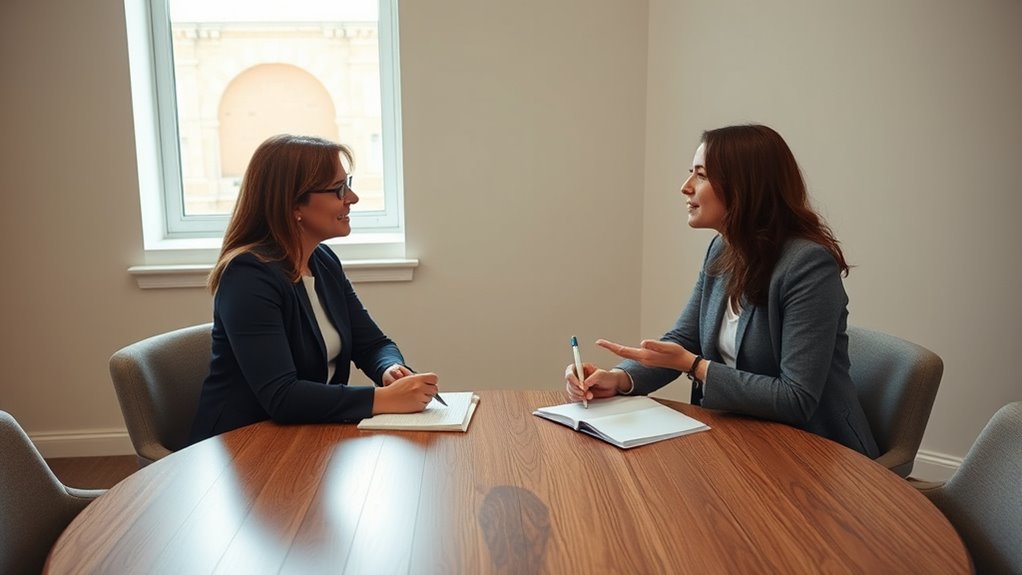Considering a mediator for your divorce can be a smart choice. Mediation offers a practical, amicable way to resolve disputes without lengthy court battles. It helps you and your partner collaborate on issues like child custody and property division, creating agreements tailored to your needs. Plus, it promotes better communication and a positive relationship moving forward. If you want to learn how mediation can simplify your process and benefit your family, there’s more to discover ahead.
Key Takeaways
- Divorce mediation offers a collaborative, private alternative to court disputes, fostering better communication and long-term cooperation.
- A neutral mediator guides discussions, helping couples explore options and develop tailored agreements suited to their needs.
- Mediation facilitates amicable property division and asset negotiation, leading to more satisfying and sustainable outcomes.
- Understanding legal requirements and jurisdiction-specific laws can streamline the process and ensure legally sound agreements.
- Considering mediation can reduce conflict, save costs, and promote a positive post-divorce relationship, especially when children are involved.

Have you ever wondered how couples can resolve their divorce disagreements without going to court? Divorce mediation offers a practical alternative that allows you and your ex-partner to work through issues like child custody and property division in a more collaborative and less stressful environment. Instead of leaving important decisions up to a judge, mediation empowers you both to create agreements that suit your unique circumstances, fostering better communication and long-term cooperation. It’s especially helpful if you’re concerned about maintaining a positive relationship post-divorce, particularly when children are involved.
During mediation, a neutral third party—the mediator—guides you through discussions, helping you explore options and find common ground. Unlike court proceedings, this process is flexible, private, and designed to reduce conflict. You’ll have the chance to express your concerns, priorities, and needs directly, which often leads to more tailored solutions. For example, when it comes to child custody, mediation encourages you to develop a parenting plan that considers your child’s best interests while respecting both parents’ roles. This collaborative approach can lead to arrangements that are more satisfactory and sustainable than what a judge might impose.
Mediation offers flexible, private discussions to create tailored, child-focused parenting plans.
Property division is another critical topic where mediation can be especially beneficial. Instead of battling over assets and debts in court, you can negotiate how to divide your property amicably. The mediator helps facilitate these discussions, ensuring that both sides are heard and that the agreements are fair. Since you’re directly involved in shaping the outcome, you’re more likely to feel satisfied with the final decision, which can ease the transition into your new lives. Additionally, understanding divorce process and requirements in your jurisdiction can help you better prepare for what to expect during mediation and beyond. A good grasp of legal considerations can further streamline the process and prevent surprises.
Engaging in mediation also provides an opportunity to learn more about residency requirements, which can be essential for establishing jurisdiction and moving forward with your divorce process efficiently. Knowing the specific grounds for divorce and other procedural details can help you and your mediator develop a realistic timeline and set appropriate expectations for your case. Furthermore, some jurisdictions may have specific mediation laws or rules that could influence how your sessions are conducted and how agreements are finalized.
Frequently Asked Questions
How Much Does Divorce Mediation Typically Cost?
You’re probably wondering how much divorce mediation costs. Mediation fees vary depending on factors like the mediator’s experience, location, and session length. On average, you might pay between $100 and $300 per hour. The total cost depends on how complex your issues are and how many sessions you need. It’s crucial to discuss cost factors upfront with your mediator to make certain you understand the overall expenses involved.
Can Mediation Be Used for High-Conflict Divorce Cases?
In high conflict dynamics, mediation can still be effective if you use the right strategies. You might worry that emotions will sabotage the process, but skilled mediators employ tailored mediation strategies to manage disputes. They help you focus on solutions rather than conflicts, encouraging cooperation. While challenging, high-conflict cases can benefit from mediation, especially when both parties are committed to resolving issues with professional guidance.
How Long Does the Mediation Process Usually Take?
The mediation timeline varies based on your case’s complexity, but typically, the process duration ranges from a few sessions to several months. You can expect several meetings where both parties work through issues with the mediator’s help. The process duration depends on how quickly you and your spouse reach agreements. Staying committed and prepared can help speed up the mediation process and reach a resolution efficiently.
Is Legal Representation Necessary During Mediation?
Like a ship needing a steady hand at the helm, you might wonder if legal advice is vital during mediation. While a mediator’s qualifications guide the process, having your own legal representation can clarify your rights and options. You’re not required to have a lawyer, but consulting one ensures you’re making well-informed decisions, especially when complex issues arise. Ultimately, legal advice helps you navigate the course safely.
What if We Can’t Agree During Mediation Sessions?
If you can’t agree during mediation sessions, don’t get discouraged. Focus on conflict resolution by openly discussing your concerns and listening to each other. Your emotional readiness is key; guarantee you’re prepared to compromise and communicate effectively. Sometimes, additional sessions or a different approach can help. Remember, mediation aims to find common ground, so stay patient and committed to working through disagreements together.
Conclusion
Considering divorce mediation is like choosing a gentle stream over a wild river—you steer towards calmer waters. It offers a path where you can navigate your differences with clarity and cooperation, rather than conflict and chaos. By partnering with a mediator, you’re planting seeds for a smoother journey ahead, turning stormy waters into a shared voyage toward resolution. So, weigh your options carefully—sometimes, the easiest route is the one that flows with understanding rather than against it.










